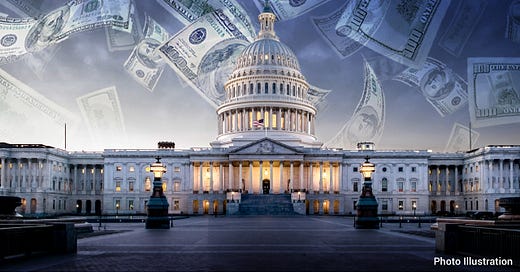Here, I discuss the national debt: Will it doom all of us? What can be done about it?
1. Background
Nearly every year, the U.S. government spends more money than it collects in taxes. There were 4 years (1998-2001) during which we had surpluses; apart from that, we’ve had big shortfalls for the last 50 years.
The deficit is the shortfall in a single year. 20 years ago (2005), the deficit was $318 billion. Last year, it was $1.8 trillion.
The national debt is the total debt we’ve accumulated from all past borrowing. 20 years ago (2005), the debt stood at $7.9 trillion. Today, it is $36 trillion.
When the government has a budget shortfall, they have to borrow money, which they do by selling U.S. Treasury bonds (“Treasurys”). These are promises by the government to pay a certain amount of money to the bond-holder at a future date. Private investors, corporations, and governments around the world buy these. E.g., someone might pay $70 for a promise of $100 in 10 years. The interest rate is implicit in the price that the bonds sell for (lower price = higher interest). E.g., in the above example, the interest rate is ~3.6% ($70*1.036^10=$100).
How does the government repay these bonds? Generally, by taxing people more in the future and/or issuing more bonds. Another possibility is that the Federal Reserve prints more money, which they use to buy Treasurys from the public. This reduces the interest rate (due to fewer outstanding bonds) but increases inflation (due to higher money supply). When they want to reduce inflation while raising interest rates, the Fed sells some of their Treasurys back to the public.
2. Why Borrow?
Why does the government borrow money every year? Why don’t they just collect the taxes to pay for their programs right now? Is there a public-spirited rationale for this?
No, it’s pure, short-term selfishness. It’s a way for politicians to provide government services & rents to special interests without raising current taxes—essentially, to try to buy votes. This means even higher taxes in future years, but politicians don’t care about that because they are just focused on the next election.
By now they’ve been doing this for so long that the government has had to collect a lot more taxes than they would have if they had never started the borrowing. Nevertheless, it continues to be in the short-term self-interest of each group of politicians, each year, to borrow still more money and slough off more cost onto the next generation.
Q: “But don’t Keynesian economists advocate deficit spending to stimulate the economy?”
A: Yes, but (a) only during a recession; they’re supposed to pay back the debt during prosperous times, not just keep borrowing. (b) Even in Keynesian terms, they don’t have to run deficits; they could instead stimulate the economy by printing money without borrowing. (c) I think Keynesian economics is BS.
3. Problems
What’s bad about borrowing money? Two immediate costs:
Interest: The annual interest payments on the debt have just topped $1.1 trillion. To put that in perspective, if you spent a million dollars every day, it would take you over 3,000 years to spend the amount of interest that we’re paying every year.
Crowding out: Government bonds compete with other investments. There is a certain supply of people with savings who want to put their money somewhere to earn some return. Because there are all these government Treasury bonds out there, a huge amount of money is diverted away from private investment in things that would grow the economy, and into the politicians’ project of trying to buy votes. Because the government is borrowing so much, it is harder for anyone else to borrow money, including people who (unlike the government) have a legitimate reason for borrowing.
More problems below.




